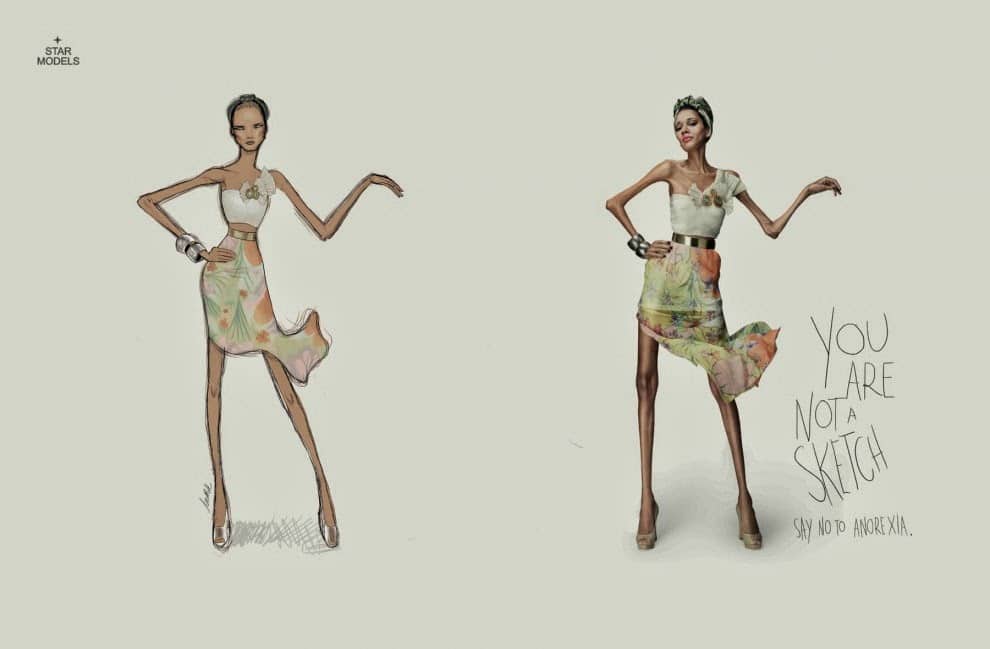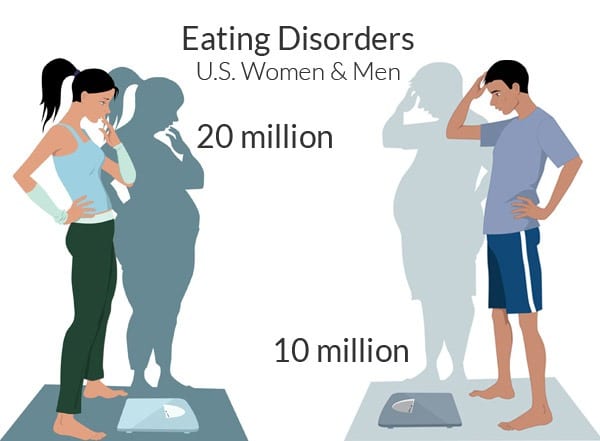We all eat to nourish our body and to survive. And this habit of eating is so deeply engrained in humans. More specifically, in developed cultures we rarely take slightest of notice of it, and continue to eat as per schedule or even at times when we are not feeling hungry. Eating is also a cultural and social activity because all cultures have different type, style and timing for eating for different occasions. However, there are some individuals who either intentionally avoid to eat or eat relentlessly and throw it up forcefully with a fear not to gain weight. This behaviour in simple terms is called Eating Disorder.

Starving oneself is not new rather it goes back in history to 12 and 13th century, but at the time it was practiced by mostly females and occasionally by men for religious practices. They would fast for some special days in order to earn blessings of their gods/goddess/deity. However, in today’s modern world, this is being practiced to keep oneself smart and slim and mass media has played a massive role in creating this image of beauty with slimness. If we looked into anthropological studies, many cultures have different standards of appreciation of beauty. Some cultures appreciate heavy people, which is considered to be a symbol of richness, happiness especially in Asia and Africa. However, as we move to much more technologically advanced cultures, like Europe and America, smartness and slimness are tied with beauty and attraction.

Some people are extremely body conscious and they do not want to gain weight in order to appear smart and slim in today’s modern world. And they may use different ways and techniques to avoid putting on extra weight; for example, engaging in activities which help to maintain a healthy body; like going to gym, playing sports, avoiding high calories food, etc. However, as long as it is done within the parameters of healthy psychological functioning, there should be no problem. But if this behaviour is consistently carried out to a point where it damages oneself biologically and psychologically then it needs to be assessed and looked into and this is called Eating Disorder.

Eating Disorder has a completely different connotation in todays’ world. When Eating Disorder is mentioned, it means self-imposed restrictions on one’s eating behaviour. Eating Disorder is usually three dimensional obsession with (a) Food, (b) Weight, and (c). Appearance. These three dimensional obsessions are so intense that lead a person to stop nourishing their body in order to fit into the modern dream beauty, not taking into the account its serious affects, not only at a personal level but also on family life, work and daily activities.
Eating Disorder could be of three types:
- Anorexia Nervosa– Individuals who limit their food to a fierce extent and damage their body organs is called Anorexia Nervosa. There is a quite high risk of death if not dealt with it in time.
- Bulimia Nervosa- Here the individuals will engage in binge eating followed by a compensatory behaviour of forced vomiting, usually done very secretly. Bulimia can also be very harmful to one’s life.
- Binge Eating Disorder- Individuals with this disorder have no control over their eating habits and they eat to an extent of obesity and at an increased risk of cardiovascular disease.
Research conducted in this area have established multi-factorial reasons for the predisposition of eating disorders, which can vary from individual to individual. For example, these research suggest the following risk factors:

Individual Personality
Individuals who are considered to be perfectionistic and have obsessional thinking are more prone to traverse the path of eating disorder. Narcissism also contribute to a larger extent towards it.
Genetics
The role of genetics is also being explored, such as the twin studies, supporting the idea of gene involvement in contributing to the causal factors of eating disorder. Which may suggest that some individuals are predisposed to eating disorders.

Post Traumatic effects
Individuals who have been suffering physical and emotional abuse, are quite prone to eating disorders. These individuals live in guilt, shame, self-blame and frustration. They blame themselves for having no control over the situation during abuse, want to regain their lost control by limiting their eating habits. This also can be considered as self-harm, to relieve some of stressful feeling they go through at the time of abuse. Bullying in school or work again could contribute a lot to eating disorder. Feeling helpless and loss of control during the actual bullying situation can contribute to control of diet. There could be also many other psychological factors, including depression, stress and anxiety, etc. as major contributory factors

However, mentioning all these bio-psycho-social causal factors, it is dependent ultimately on the individual’s coping skills. As in majority of the cases, the underlying psychological phenomenon of eating disorder is the perception of loss of control, which is managed through regaining the lost control by using diet. However, if a person is equipped well enough to manage these psychological pressures provoking situations with passion and resilience, they will not take the route of self-harm like controlling diet.

No one denies the fact of genetic and biological dispositional factors, however, the downside of it is it takes away the individual’s own determination/willpower which ultimately can play a major factor in being resilient in odd situations. Further there are many cultures/societies that still exist with no awareness relating to eating disorders behaviour, especially in the 3rd world countries where people die of starvation, so in this case, the genetic and biological factors can be questionable. We also know, and behaviourists even accept that between stimulus and response there is always space and this space is our power to choose our response. In our response lies our growth and freedom.
